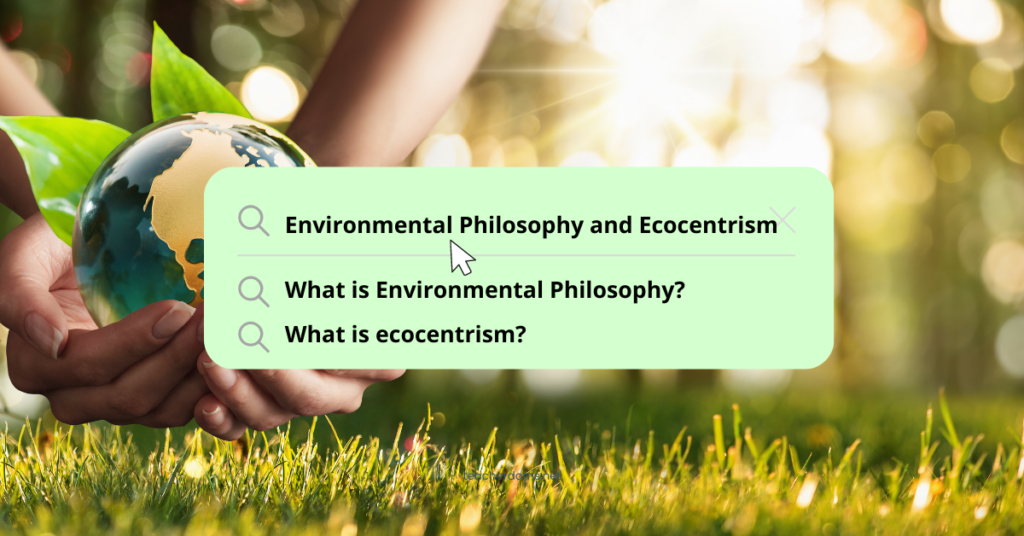
Environmental Philosophy and Ecocentrism: A Paradigm Shift in Environmental Ethics
In the face of escalating environmental challenges and the undeniable impact of climate change, the discourse on environmental philosophy has become increasingly relevant. Central to this discourse is the philosophy of ecocentrism, which challenges the longstanding anthropocentric viewpoint that has shaped human interactions with the natural world.
This analysis delves into the significance of environmental philosophy in the context of current global concerns, explores the core tenets of ecocentrism, and examines the implications of adopting an ecocentric perspective for redefining human-nature relationships.
Significance of Environmental Philosophy
As environmental issues take center stage on the global agenda, environmental philosophy offers a robust framework for comprehending the ethical dimensions of humanity’s interaction with the environment. This philosophical approach transcends traditional anthropocentric paradigms by examining the moral standing of non-human entities and ecosystems (Callicott, 1989).
Environmental philosophy engages with questions about the value of nature, our responsibilities toward it, and the implications of our actions on present and future generations. Environmental philosophers grapple with ontological, epistemological, and ethical dimensions to articulate a holistic framework that transcends human-centered approaches (Eckersley, 2023).
Ecocentrism: A Paradigm of Intrinsic Value
Ecocentrism emerges as a noteworthy paradigm within environmental philosophy, championing the intrinsic value of ecosystems, species, and natural entities. Contrary to anthropocentrism, which prioritizes human interests over all else, ecocentrism asserts that nature possesses inherent worth independent of its utility to humanity (Gray et al., 2018). This philosophy considers ecosystems as interconnected wholes, where each component contributes to the overall balance and stability of the environment.
Key Principles of Ecocentrism
1. Inherent Value
Ecocentrism posits that nature possesses intrinsic value and is deserving of moral consideration beyond its utility to human needs. This principle challenges the conventional instrumental view of nature (Rowe, 1994; Taylor, 2013).
2. Holistic Perspective
Ecocentrism underscores the interconnectedness of ecological systems, highlighting the interdependencies among species and the delicate equilibrium that sustains life on Earth (Imran et al., 2014; Eze, 2017).
3. Biocentric Equality
This principle asserts that all living organisms, regardless of their utility to humans, deserve respect and ethical consideration. Ecocentrism thus extends moral consideration to all forms of life (Golley, 1987; Sterba, 2011).
Implications and Applications of Environmental Philosophy and Ecocentrism
Ecocentrism has significant implications for environmental ethics and policy-making. By recognizing the intrinsic value of nature, it provides a moral foundation for biodiversity conservation, habitat preservation, and sustainable resource management. Ecocentric principles challenge the unsustainable exploitation of natural resources and advocate for practices that maintain ecological integrity and resilience (De Groot et al., 2011; Eckersley, 2023).
Challenges and Critiques
Critics of ecocentrism argue that it may overshadow the immediate needs of marginalized human populations, especially in the context of poverty and development. The challenge lies in striking a balance between ecological preservation and social equity (Steverson, 1991; Kortetmäki, 2013).
Conclusion
Environmental philosophy, with ecocentrism as a prominent strand, offers an alternative ethical perspective that transcends anthropocentrism. In an era marked by environmental degradation and climate crisis, ecocentrism calls for a profound shift in the way humans perceive and relate to nature. By emphasizing the intrinsic value of ecosystems and nature, this philosophy redefines our ethical responsibilities, paving the way for a more sustainable and harmonious coexistence between humanity and the environment.
References:
- Callicott, J. B. (1989). In defense of the land ethic: Essays in environmental philosophy. Suny Press.
- De Groot, M., Drenthen, M., & De Groot, W. T. (2011). Public visions of the human/nature relationship and their implications for environmental ethics. Environmental Ethics, 33(1), 25.
- Eckersley, R. (2023). Environmentalism and political theory: Toward an ecocentric approach. Routledge.
- Eze, M. O. (2017). Humanitatis-eco (Eco-humanism): An African environmental theory. The Palgrave handbook of African philosophy, 621-632.
- Golley, F. B. (1987). Deep ecology from the perspective of ecological science. Environmental Ethics, 9(1), 45-55.
- Gray, J., Whyte, I., & Curry, P. (2018). Ecocentrism: What it means and what it implies. The Ecological Citizen, 1(2), 130-131.
- Imran, S., Alam, K., & Beaumont, N. (2014). Reinterpreting the definition of sustainable development for a more ecocentric reorientation. Sustainable development, 22(2), 134-144.
- Kortetmäki, T. (2013). Anthropocentrism versus ecocentrism revisited: Theoretical confusions and practical conclusions. SATS , 14 (1), 21-37.
- Rowe, J. S. (1994). Ecocentrism and traditional ecological knowledge. Ecospherics Ethics.
- Sterba, J. P. (2011). Biocentrism defended. Ethics, Policy & Environment, 14(2), 167-169.
- Steverson, B. K. (1991). A critique of ecocentric environmental ethics. Tulane University, Graduate Program in Biomedical Sciences.
- Taylor, PW (2013). Respect for nature. In Environmental ethics (pp. 215-222).